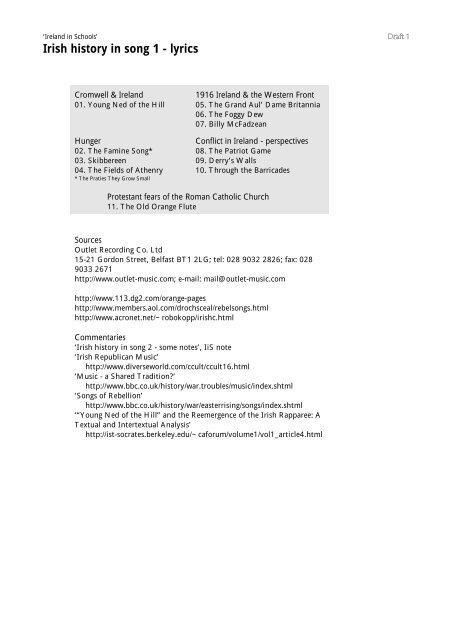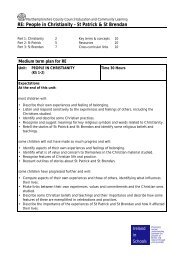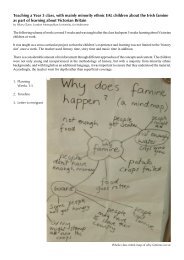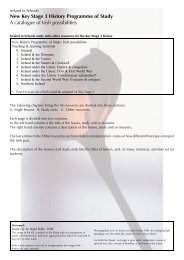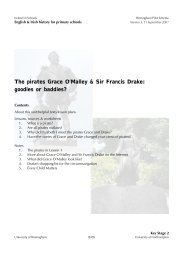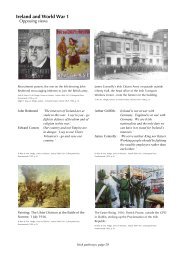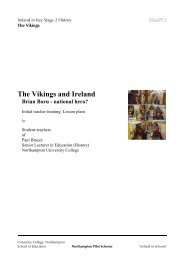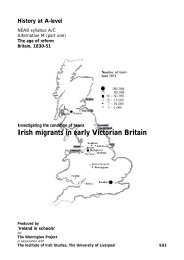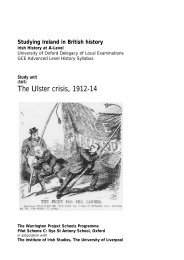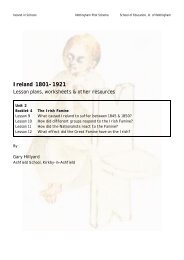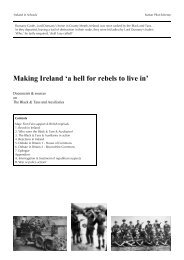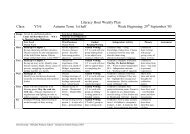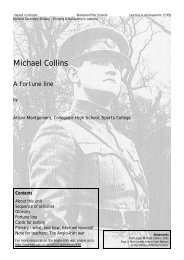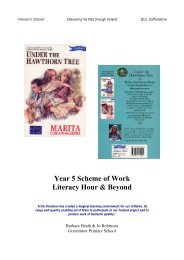E:\Irish music\A4 Irish history in song 1 & 2.wpd - Ireland in Schools
E:\Irish music\A4 Irish history in song 1 & 2.wpd - Ireland in Schools
E:\Irish music\A4 Irish history in song 1 & 2.wpd - Ireland in Schools
Create successful ePaper yourself
Turn your PDF publications into a flip-book with our unique Google optimized e-Paper software.
‘<strong>Ireland</strong> <strong>in</strong> <strong>Schools</strong>’<strong>Irish</strong> <strong>history</strong> <strong>in</strong> <strong>song</strong> 1 - lyricsCromwell & <strong>Ireland</strong>01. Young Ned of the HillHunger02. The Fam<strong>in</strong>e Song*03. Skibbereen04. The Fields of Athenry* The Praties They Grow Small1916 <strong>Ireland</strong> & the Western Front05. The Grand Aul’ Dame Britannia06. The Foggy Dew07. Billy McFadzeanConflict <strong>in</strong> <strong>Ireland</strong> - perspectives08. The Patriot Game09. Derry’s Walls10. Through the BarricadesProtestant fears of the Roman Catholic Church11. The Old Orange FluteSourcesOutlet Record<strong>in</strong>g Co. Ltd15-21 Gordon Street, Belfast BT1 2LG; tel: 028 9032 2826; fax: 0289033 2671http://www.outlet-music.com; e-mail: mail@outlet-music.comhttp://www.113.dg2.com/orange-pageshttp://www.members.aol.com/drochsceal/rebel<strong>song</strong>s.htmlhttp://www.acronet.net/~robokopp/irishc.htmlCommentaries‘<strong>Irish</strong> <strong>history</strong> <strong>in</strong> <strong>song</strong> 2 - some notes’, IiS note‘<strong>Irish</strong> Republican Music’http://www.diverseworld.com/ccult/ccult16.html‘Music - a Shared Tradition?’http://www.bbc.co.uk/<strong>history</strong>/war.troubles/music/<strong>in</strong>dex.shtml‘Songs of Rebellion’http://www.bbc.co.uk/<strong>history</strong>/war/easterris<strong>in</strong>g/<strong>song</strong>s/<strong>in</strong>dex.shtml‘“Young Ned of the Hill” and the Reemergence of the <strong>Irish</strong> Rapparee: ATextual and Intertextual Analysis’http://ist-socrates.berkeley.edu/~caforum/volume1/vol1_article4.html
Cromwell & <strong>Ireland</strong>01. Young Ned of the HillThe Pogues Peace & Love, CD, 1989, Island Records, 422-842-2Have you ever walked the lonesome hillsAnd heard the curlews cryOr seen the raven black as nightUpon a w<strong>in</strong>dswept skyTo walk the purple heatherAnd hear the westw<strong>in</strong>d cryTo know that’s where the rapparee must dieS<strong>in</strong>ce Cromwell pushed us westwardTo live our lowly livesThere’s some of us have deemed to fightFrom Tipperary mounta<strong>in</strong>s highNoble men with wills of ironWho are not afraid to dieWho’ll fight with Gaelic honour held on highA curse upon you Oliver CromwellYou who raped our MotherlandI hope you’re rott<strong>in</strong>g down <strong>in</strong> hellFor the horrors that you sentTo our misfortunate forefathersWhom you robbed of their birthright‘To hell or Connaught’ may you burn <strong>in</strong> hell tonightOf one such man I’d like to speakA rapparee by name and deedHis family dispossessed and slaughteredThey put a price upon his headHis name is known <strong>in</strong> <strong>song</strong> and storyHis deeds are legend stillAnd murdered for blood moneyWas young Ned of the hillYou have robbed our homes and fortunesEven drove us from our landYou tried to break our spiritBut you’ll never understandThe love of dear old <strong>Ireland</strong>That will forge an iron willAs long as there are gallant menLike young Ned of the hillIiS, <strong>Irish</strong> <strong>history</strong> <strong>in</strong> <strong>song</strong> 1 & 2, page 2
Hunger02. The Fam<strong>in</strong>e Song (The Praties They Grow Small)The Alias Acoustic Band <strong>Irish</strong> Songs, Tunes, Poetry and Speech of Rebellion, Resistance & Reconciliation, CD, 1998, Proper/Retro, R2CD 40-73Oh, the praties they grow small over here, over hereOh, the praties they grow small over here, over hereOh, the praties they grow small, and we dig them <strong>in</strong> the fallAnd we eat them, sk<strong>in</strong> and all, over here, over here, over here.Oh we wish that we were geese, night and morn, night and mornOh we wish that we were geese, night and morn, night and mornOh we wish that we were geese, and could live our lives <strong>in</strong> peaceTill the hour of our release, eat<strong>in</strong>g corn, eat<strong>in</strong>g corn, eat<strong>in</strong>g corn.Oh, we’re down <strong>in</strong>to the dust, over here, over hereOh, we’re down <strong>in</strong>to the dust, over here, over hereOh, we’re down <strong>in</strong>to the dust, but the Lord <strong>in</strong> whom we trustWill repay us crumb for crust, over here, over here, over here.COME LAY ME DOWNChorusCome lay me down, and treat me decentCome lay me down, and fill my canCome lay me down love, and treat me decentFor surely you’re an honest man.As I walked out through Galway CityAs I walked out on a pleasant walkAs we were walk<strong>in</strong>g, I could hear them talk<strong>in</strong>gOh surely he’s an honest man.The crops are dy<strong>in</strong>g, the children cry<strong>in</strong>gThere is widespread hunger all over the landBut when you return, will you treat me decent?For surely you’re an honest man.When I return, I will treat you decentWhen I return, I will fill your canWhen I return, I will bury you decentFor I know that you’re an honest man.IiS, <strong>Irish</strong> <strong>history</strong> <strong>in</strong> <strong>song</strong> 1 & 2, page 3
03. Skibbereen One of the areas most affected by the Fam<strong>in</strong>e - and the most publicisedThe Alias Acoustic Band <strong>Irish</strong> Songs, Tunes, Poetry and Speech of Rebellion, Resistance & Reconciliation, CD, 1998, Proper/Retro, R2CD 40-73Oh, Father, dear, I often hear you speak of Er<strong>in</strong>’s isleHer lofty scenes, her valleys green, her mounta<strong>in</strong>s rude and wildThey say it is a lovely land, where<strong>in</strong> a pr<strong>in</strong>ce might dwellOh why did you abandon it, the reason to me tell.My son, I loved my native land with energy and prideTill the blight came over all my crops, my sheep and cattle diedMy rent and taxes were so high, I could not them redeemThat’s the cruel reason I left old Skibbereen.It’s well I do remember the year of ‘98When I arose a Fenian to battle aga<strong>in</strong>st our fateI was hunted through the mounta<strong>in</strong>s as a traitor to the QueenThat’s another reason I left old Skibbereen.It’s well I do remember the cold November dayWhen the landlord and the sheriff came to drive us all awayThey set our roof ablaze <strong>in</strong> fire with their damn<strong>in</strong>g yellow spleenThat’s another reason why I left old Skibbereen.Your mother, too, God rest her soul, fell on the snowy groundShe fa<strong>in</strong>ted <strong>in</strong> her anguish, the desolation roundShe never rose but passed away from life to mortal dreamShe found a grave and place of rest <strong>in</strong> dear old Skibbereen.You were only two months old, and feeble was your frameI could not leave you with my friends, you bore your father’s nameI wrapped you <strong>in</strong> my cóótamóór, at the dead of night unseenWe heaved a sigh and bid goodbye to dear old Skibbereen.Oh father, dear, the day will come when on vengeance we will callWhen <strong>Irish</strong>men both stout and stern will rally one and allI’ll be the man to lead the van, beneath the flag of greenAnd loud and high we’ll raise the cry, ‘Revenge for Skibbereen’.IiS, <strong>Irish</strong> <strong>history</strong> <strong>in</strong> <strong>song</strong> 1 & 2, page 4
04. The Fields of AthenryPatrick Sarsfield Celtic Supporters Club (record<strong>in</strong>g of modern lyrics)www.patricksarsfieldcsc.comModern lyrics by Pete St John, 1979By a lonely prison wallI heard a young girl call<strong>in</strong>g,‘Michael, they are tak<strong>in</strong>g you away.For you stole Travelian’s corn,So the young might see the morn,Now a prison ship lies wait<strong>in</strong>g <strong>in</strong> the bay.’ChorusLow lie the fields of AthenryWhere once we watched the small freebirds fly.Our love was on the w<strong>in</strong>g,We had dreams and <strong>song</strong>s to s<strong>in</strong>gIt’s so lonely ‘round the fields of Athenry.By a lonely prison wallI heard a young man call<strong>in</strong>g‘Noth<strong>in</strong>g matters, Mary, when you’re freeAga<strong>in</strong>st the fam<strong>in</strong>e and the crown,I rebelled, they ran me down,Now you must raise our children with dignity.’ChorusBy a lonely harbour wall,She watched the last star fall<strong>in</strong>gAs the prison ship sailed out across the skyBut she’ll watch and hope and pray,For her love <strong>in</strong> Botany BayIt’s so lonely ‘round the fields of Athenry.It’s so lonely ‘round the fields of Athenry.As orig<strong>in</strong>ally published <strong>in</strong> 1888By a lonely prison wallI heard a sweet voice call<strong>in</strong>g,‘Danny, they have taken you away.For you stole Travelian’s corn,That your babes might see the morn,Now a prison ship lies wait<strong>in</strong>g <strong>in</strong> the bay.’ChorusFair lie the fields of AthenryWhere once we watched the small freebirds fly.Our love grew with the spr<strong>in</strong>g,We had dreams and <strong>song</strong>s to s<strong>in</strong>gAs we wandered through the fields of Athenry.By a lonely prison wallI heard a young man call<strong>in</strong>g‘Noth<strong>in</strong>g matters, Jenny, when you’re freeAga<strong>in</strong>st the fam<strong>in</strong>e and the crown,I rebelled, they ran me down,Now you must raise our children without me.’ChorusOn the w<strong>in</strong>dswept harbour wall,She watched the last star ris<strong>in</strong>gAs the prison ship sailed out across the skyBut she’ll watch and hope and pray,For her love <strong>in</strong> Botany BayWhilst she is lonely <strong>in</strong> the fields of Athenry.Whilst she is lonely <strong>in</strong> the fields of Athenry.IiS, <strong>Irish</strong> <strong>history</strong> <strong>in</strong> <strong>song</strong> 1 & 2, page 5
1916 <strong>Ireland</strong> & the Western Front05. The Grand Aul’ Dame Britannia World War I anti-enlistment <strong>song</strong>, written by Sean O’Casey <strong>in</strong> 1916The Alias Acoustic Band <strong>Irish</strong> Songs, Tunes, Poetry and Speech of Rebellion, Resistance & Reconciliation, CD, 1998, Proper/Retro, R2CD 40-73Ah, what is all the fuss about,Says the grand aul’ dame Britannia,Is it us you’re try<strong>in</strong>g to live without,Says the grand aul’ dame Britannia.Oh, don’t believe those S<strong>in</strong>n Fe<strong>in</strong> lies,For every Gael for England dies,Will enjoy ‘Home Rule’ ’neath the <strong>Irish</strong> skies,Says the grand aul’ dame Britannia.O Redmond has the battle won,Says the grand aul’ dame Britannia.He has f<strong>in</strong>ished what Wolfe Tone begun,Says the grand aul’ dame Britannia.Though Sh<strong>in</strong>ners through the country stalk,Here’s sixty-seven and Bachelors Walk,Did you ever hear such foolish talk,Says the grand aul’ dame Britannia.You’ll want to knock a pound off me,Says the grand aul’ dame Britannia.For Hibernian’s Academy,Says the grand aul’ dame Britannia.But first I’ve got the Hun to quell,And I need your gold for shot and shell,And your artists all can go to hell,Says the grand aul’ dame Britannia.Scholars, authors, sa<strong>in</strong>ts and bards,Says the grand aul’ dame Britannia.Come along and enlist <strong>in</strong> the <strong>Irish</strong> Guards,Says the grand aul’ dame Britannia.Everyman who treads the German beat,Will get a parcel tied up neat,A Home Rule badge and a w<strong>in</strong>d-up sheet,Says the grand aul’ dame Britannia.IiS, <strong>Irish</strong> <strong>history</strong> <strong>in</strong> <strong>song</strong> 1 & 2, page 6
06. The Foggy Dew Written <strong>in</strong> 1919 by a member of the First Dáil moved by the absence of members ‘locked up by the foreigner’No named artistesThe Complete <strong>Irish</strong> National Anthem, CD, 1998, Derry Records, IRB 1937CDAs down the glen one Easter mornThrough a city fair rode I.There armed l<strong>in</strong>es of march<strong>in</strong>g men,In squadrons did pass me by.No pipe did hum, no battle drum,Did sound out its loud tattoo.But the angelus bell o’er the Liffey’s swell,Rang out through the foggy dew.Right proudly high over Dubl<strong>in</strong> townThey flung out the flag of war.’Twas far better to die ’neath an <strong>Irish</strong> sky,Than at Suvla or Sud el Bar.And from the pla<strong>in</strong>s of royal Meath,Brave men came hurry<strong>in</strong>g through,While Britannia’s Huns with their long-range guns,Sailed <strong>in</strong>to the foggy dew.But the night fell black and the rifle’s crack,Made perfidious Albion reel.Through that leaden hail seven tongues of flame,Did sh<strong>in</strong>e o’er the l<strong>in</strong>es of steel.By each sh<strong>in</strong><strong>in</strong>g blade a prayer was said,That to <strong>Ireland</strong> her sons would be true,And when morn<strong>in</strong>g broke, still the green flag shook out,Its folds <strong>in</strong> the foggy dew.It was England bade our Wild Geese go,That small nations might be free.But their lonely graves are by Suvla’s wavesOn the fr<strong>in</strong>ge of the great North Sea.Oh, had they died by Pearse’s sideOr had fought along with brave Cathal Brugha,Their names we would keep where the Fenians sleep,’Neath the shroud of the foggy dew.But the bravest fell and the requiem knell,Rang out mournfully and clear,For those who died that EastertideIn the spr<strong>in</strong>gtime of the year.While the world did gaze with deep amaze,At those fearless men and few,Who bore the fight that freedom’s light,Might sh<strong>in</strong>e through the foggy dew.As back through the glen I rode aga<strong>in</strong>,And my heart with grief was sore.For I parted then with those gallant men,I ever will see no more,And to and fro <strong>in</strong> my dreams I go,And I’ll kneel and I’ll say a prayer for you,For slavery fled, oh you gallant dead,When you fell <strong>in</strong> the foggy dew.IiS, <strong>Irish</strong> <strong>history</strong> <strong>in</strong> <strong>song</strong> 1 & 2, page 7
07. Billy McFadzean A twenty-year-old Belfast man was awarded the VC posthumously for heroism on the first day of the Battle of the SommeAnonymous from Orange Jukebox - ‘Lest We Forget’www.113.dg2.com/orange-pagesLet me tell you a story of honour and gloryOf a young Belfast soldier Billy McFadzean by nameFor K<strong>in</strong>g and for Country Young Billy died bravelyAnd won the VC on the fields of the Somme.ChorusGone like the snowflakes that melts <strong>in</strong> the riverGone like the first rays of days early dawnLike the foam from the founta<strong>in</strong>Like the mist of the mounta<strong>in</strong>Young Billy McFadzean’s dear life has gone.Now Billy lies only where the red Flanders poppyIn the wildest profusion pa<strong>in</strong>ts the field of the braveNo piper recall<strong>in</strong>g his deeds all forgottenFor Bill McFadzean has no known grave.ChorusGone like the snowflakes that melts <strong>in</strong> the riverGone like the first rays of days early dawnLike the foam from the founta<strong>in</strong>Like the mist of the mounta<strong>in</strong>Young Billy McFadzean’s dear life has gone.So let us remember that brave Ulster soldierThe VC he won the young life he gaveFor duty demand<strong>in</strong>g his courage outstand<strong>in</strong>gPrivate Billy McFadzean of the U.V.F.IiS, <strong>Irish</strong> <strong>history</strong> <strong>in</strong> <strong>song</strong> 1 & 2, page 8
Conflict <strong>in</strong> <strong>Ireland</strong> - perspectives08. The Patriot GameThe Alias Acoustic Band <strong>Irish</strong> Songs, Tunes, Poetry and Speech of Rebellion, Resistance & Reconciliation, CD, 1998, Proper/Retro, R2CD 40-73Come all ye young rebels, and list while I s<strong>in</strong>gFor the love of one’s country is a terrible th<strong>in</strong>gIt banishes fear with the speed of a flameAnd it makes us all part of the patriot game.My name is O’Hanlon, and I’ve just turned sixteenMy home is <strong>in</strong> Monaghan, and where I was weanedI learned all my life cruel England’s to blameSo now I am part of the patriot game.It’s nearly two years s<strong>in</strong>ce I wandered awayWith the local battalion of the bold IRAI learned of our heroes, and wanted the sameTo play my own part of the patriot game.This island of ours has too long been half freeSix counties lie under John Bull’s tyrannySo I gave up my boyhood to drill and to tra<strong>in</strong>And that made me a part of the Patriot game.They told me how Connolly was shot <strong>in</strong> his chairHis wounds from the fight<strong>in</strong>g all bloody and bareHis f<strong>in</strong>e body twisted, all battered and lameThey soon made me part of the patriot game.But now as I lie here, my body all holesI th<strong>in</strong>k of those traitors who barga<strong>in</strong>ed <strong>in</strong> soulsAnd I wish that my rifle had given the sameTo those Quisl<strong>in</strong>gs who sold out the patriot game.IiS, <strong>Irish</strong> <strong>history</strong> <strong>in</strong> <strong>song</strong> 1 & 2, page 9
09. Derry’s WallsSam Carson No Surrender, CD, 1995, CDUCD 3The time has scarce gone by boys, two hundred years ago,When Rebels on old Derry’s Walls their faces dare not show;When James and all his rebel band came up to Bishops Gate;With heart and hand and sword and shield we caused them to retreat;ChorusThen work and don’t surrender but come when duty calls,With heart and hand, and sword and shield - we’ll guard old Derry’s Walls.The blood it did flow <strong>in</strong> the streams for many a w<strong>in</strong>ter’s night,They knew the Lord was on their side, to help them <strong>in</strong> the fight;They only stood upon the walls determ<strong>in</strong>ed for to fight,To fight and ga<strong>in</strong> the victory and hoist the Crimson high.ChorusThen work and don’t surrender but come when duty calls,With heart and hand, and sword and shield - we’ll guard old Derry’s Walls.At last, at last with one broadside the heavens sent their maze,The boom was broke that crosses Foyle’s shores and James he was dismayed;The Banner, boys that floated, was run aloft with joy,God bless the hands that broke the boom and saved Apprentice Boys.ChorusThen work and don’t surrender but come when duty calls,With heart and hand, and sword and shield - we’ll guard old Derry’s Walls.IiS, <strong>Irish</strong> <strong>history</strong> <strong>in</strong> <strong>song</strong> 1 & 2, page 10
10. Through the Barricades Inspired by the spectacle of physical as well as mental barriers dur<strong>in</strong>g a visit to Northern <strong>Ireland</strong> <strong>in</strong> the 1980sSpandau Ballet Gold. The Best of Spandau Ballet, CD, 2000, EMI, LC0 0542Mother doesn’t know where love has gone,She says it must be youth that keeps us feel<strong>in</strong>g strong.See it <strong>in</strong> her face that’s turned to ice,And when she smiles she shows the l<strong>in</strong>es of sacrifice.And now I know what they’re say<strong>in</strong>g as our sun beg<strong>in</strong>s to fade,And we made our love on wasteland and through the barricades.Father made my <strong>history</strong>,He fought for what he thought would set us somehow free.They taught me what to say <strong>in</strong> school,I learned it off by heart but now that’s torn <strong>in</strong> two.And now I know what they’re say<strong>in</strong>g <strong>in</strong> the music of the parade,And we made our love on wasteland and through the barricades.Born on different sides of life,But we feel the same and feel all of this strife,So come to me when I’m asleep and we’ll cross the l<strong>in</strong>e and dance upon the streets.And now I know what they’re say<strong>in</strong>g as the drums beg<strong>in</strong> to fade,And we made our love on wasteland and through the barricades.Oh, turn around and I’ll be there,Well there’s a scar right through my heart but I’ll bare it aga<strong>in</strong>.Oh, I thought we were the human race but we were just another borderl<strong>in</strong>e case,And the stars reach down and tell us that there’s always one escape.Oh, I don’t know where love has gone,And <strong>in</strong> this troubled land desperation keeps us strong.Friday’s child is full of soul,With noth<strong>in</strong>g left to lose there’s everyth<strong>in</strong>g to go.And now I know what they’re say<strong>in</strong>g,It’s a terrible beauty we’ve made,So we make our love on wasteland and through the barricades.And now I know what they’re say<strong>in</strong>g as our hearts go to their graves,And we made our love on wasteland and through the barricades.IiS, <strong>Irish</strong> <strong>history</strong> <strong>in</strong> <strong>song</strong> 1 & 2, page 11
Protestant fears of the Roman Catholic Church11. The Old Orange Flute The words vary a little between versionsSam Carson No Surrender, CD, 1995, CDUCD 3In the county Tyrone, <strong>in</strong> the town of DungannonWhere many a ruckus meself had a hand <strong>in</strong>Bob Williamson lived there, a weaver by tradeAnd all of us thought him a stout Orange blade.On the twelfth of July as it yearly did comeBob played on the flute to the sound of the drumYou can talk of your fiddles, your harp or your luteBut there's noth<strong>in</strong>g could sound like the Old Orange Flute.But the treacherous scoundrel, he took us all <strong>in</strong>For he married a Papist named Bridget McG<strong>in</strong>nTurned Papish himself and forsook the Old CauseThat gave us our freedom, religion and laws.And the boys <strong>in</strong> the county made such a stir on itThey forced Bob to flee to the prov<strong>in</strong>ce of Connaught;Took with him his wife and his fix<strong>in</strong>s, to boot,And along with the rest went the Old Orange Flute.Each Sunday at mass, to atone for past deeds,Bob said Paters and Aves and counted his beadsTill one Sunday morn, at the priest's own requireBob went for to play with the flutes <strong>in</strong> the choir.He went for to play with the flutes <strong>in</strong> the massBut the <strong>in</strong>strument quivered and cried. ‘O Alas!’And blow as he would, though he made a great noise,The flute would play only ‘The Protestant Boys’.Bob jumped up and huffed, and was all <strong>in</strong> a flutter.He pitched the old flute <strong>in</strong> the best holy water;He thought that this charm would br<strong>in</strong>g some other sound,When he tried it aga<strong>in</strong>, it played ‘Croppies Lie Down!’And for all he would f<strong>in</strong>ger and twiddle and blowFor to play Papish music, the flute would not go;‘Kick the Pope’ to ‘Boyne Water’ was all it would soundNot one Papish bleat <strong>in</strong> it could e’er be found.At a council of priests that was held the next dayThey decided to banish the Old Flute away;They couldn't knock heresy out of its headSo they bought Bob another to play <strong>in</strong> its stead.And the Old Flute was doomed, and its fate was pathetic'Twas fastened and burnt at the stake as heretic.As the flames rose around it, you could hear a strange noise'Twas the Old Flute still a-whistl<strong>in</strong>’ ‘The Protestant Boys’.IiS, <strong>Irish</strong> <strong>history</strong> <strong>in</strong> <strong>song</strong> 1 & 2, page 12
‘<strong>Ireland</strong> <strong>in</strong> <strong>Schools</strong>’<strong>Irish</strong> <strong>history</strong> <strong>in</strong> <strong>song</strong> 2 - some notes1. Street ballads as historical evidence2. <strong>Irish</strong> <strong>history</strong> <strong>in</strong> <strong>song</strong> 1: <strong>song</strong>s of hunger3. A case study - from home rule to <strong>in</strong>dependence4. A modern polemic? ‘Young Ned of the Hill’ by the PoguesIiS, <strong>Irish</strong> <strong>history</strong> <strong>in</strong> <strong>song</strong> 1 & 2, page 13
Street ballads as historical evidencebased on Songs of <strong>Irish</strong> rebellion. <strong>Irish</strong> political street ballads and rebel <strong>song</strong>sG.D. Zimmerman, Four Courts Press, 2 nd ed. 2002 (first published 1966), 1-85182-629-7, pp 9-13Survival of political <strong>song</strong>s <strong>in</strong> <strong>Ireland</strong>In most European countries, <strong>song</strong>s were <strong>in</strong>spired by political events, but few of them, if any, were reta<strong>in</strong>edby tradition.Sometimes, however, particularly when a fight for <strong>in</strong>dependence had been a long and hard one co<strong>in</strong>cid<strong>in</strong>gwith a strong current of folk s<strong>in</strong>g<strong>in</strong>g, a certa<strong>in</strong> number of such <strong>song</strong>s or ballads survived. <strong>Ireland</strong> is oneof the countries where patriotic and political <strong>song</strong>s have been for a long time peculiarly popular, andperhaps <strong>in</strong>fluential.History and sociological documents - reflect<strong>in</strong>g popular feel<strong>in</strong>gsSuch <strong>song</strong>s gave utterance to the op<strong>in</strong>ions and feel<strong>in</strong>gs of an important part of the <strong>Irish</strong> people <strong>in</strong>political, social, and religious matters. They reflect two ma<strong>in</strong> trends:1. the struggle of the peasantry to take possession of the land; and2. the nationalist yearn<strong>in</strong>gs of the middle class, often <strong>in</strong>term<strong>in</strong>gled with the efforts to obta<strong>in</strong> emancipation fromthe religious disabilities imposed on the majority.The habit of writ<strong>in</strong>g and s<strong>in</strong>g<strong>in</strong>g such political <strong>song</strong>s <strong>in</strong> English developed <strong>in</strong> the cities <strong>in</strong> the eighteenthcentury, and later on <strong>in</strong> the countryside, when the English language began to replace <strong>Irish</strong> among thepeasantry. A number of these so-called rebel <strong>song</strong>s are still popular to-day.As with ballad makers throughout <strong>history</strong>, <strong>Irish</strong> ballad makers often relied heavily on sarcasm, the onlyweapon the oppressed had aga<strong>in</strong>st the powerful. This was well illustrated <strong>in</strong> <strong>Irish</strong> anti-enlistment andanti-conscription ballads dur<strong>in</strong>g World War I which specialised <strong>in</strong> lampoon<strong>in</strong>g politicians and authorityfigures who encouraged <strong>Irish</strong>men to fight <strong>in</strong> ‘foreign wars’.PurposesThese <strong>song</strong>s, which were with<strong>in</strong> the reach of the virtually illiterate, were not only1. an expression of the s<strong>in</strong>gers’ and listeners’ feel<strong>in</strong>gs or op<strong>in</strong>ions but also2. a form of propaganda.‘Curious melt<strong>in</strong>g pot’When pr<strong>in</strong>ters became <strong>in</strong>terested <strong>in</strong> them, they became almost an <strong>in</strong>dustry. Their heterogeneous characteris evident: part literature, part folklore, they belong mostly to that less respected mass of pr<strong>in</strong>ted materialof a journalistic type which was sold on the streets. They have borrowed elements from every side,sometimes reproduc<strong>in</strong>g them with strange alterations.1. Traditional folk patterns <strong>in</strong>term<strong>in</strong>gle with forms and themes adapted from upper-class culture.2. Other features arose from the function that the street ballad had to fulfil, namely to exploit the popular tastefor stories and for sensationalism <strong>in</strong> appeal<strong>in</strong>g to basic emotions, <strong>in</strong> a simple text which was shouted on thepublic square.3. These ballads are also composite <strong>in</strong> that they are related both to the Gaelic <strong>Irish</strong> and the English folk orpopular traditions.They are thus a curious melt<strong>in</strong>g pot for different k<strong>in</strong>ds of literature or subliterature.Common characteristicsThe popular political <strong>song</strong>s of <strong>Ireland</strong> can nevertheless be considered as a whole. With all their diversity,they share common characteristic features. Though they depended on current events for their subjectmatter,they show an ever-recurr<strong>in</strong>g body of themes and motifs and a fairly complex system of symbols.1. Stock situations are usually phrased <strong>in</strong> the same words.2. As for their heroes, even when they are named and stand for real people they tend to conform to types.Precision of date, place and other circumstance does not hide the fact that they are less <strong>in</strong>dividuals of fleshand blood than conventional characters.IiS, <strong>Irish</strong> <strong>history</strong> <strong>in</strong> <strong>song</strong> 1 & 2, page 14
The concept of ‘rebel <strong>song</strong>’ was vigorous enough for the <strong>Irish</strong>, but never clearly formulated; the audience,and the police too, could identify the genre <strong>in</strong> spite of all its formal and thematical variations.Historical significanceWhile the political street ballads had some <strong>in</strong>fluence on the attitude of the <strong>Irish</strong> people, and therefore onthe course of <strong>Irish</strong> <strong>history</strong>, we cannot say precisely to what extent.1. They were effect and cause at the same time: express<strong>in</strong>g strong collective emotions, they could profoundlyaffect the climate of op<strong>in</strong>ion.2. They were effective <strong>in</strong> shap<strong>in</strong>g a common memory of some events and <strong>in</strong> b<strong>in</strong>d<strong>in</strong>g the <strong>Irish</strong> together.Promot<strong>in</strong>g action, confirm<strong>in</strong>g attitudesIn every period before an expected ris<strong>in</strong>g, nationalist movements published violent <strong>song</strong>s which must havehelped to raise the public to a high pitch of excitement and to prepare the m<strong>in</strong>ds for com<strong>in</strong>g disturbances.Through them the desire was born <strong>in</strong> some young men to conform to the popular idea of a national heroand perhaps to die a martyr’s death. More than <strong>in</strong> <strong>in</strong>itiat<strong>in</strong>g action, however, they seem to have beeneffective <strong>in</strong> confirm<strong>in</strong>g people <strong>in</strong> their own already exist<strong>in</strong>g attitudes; they excited deeply only those whowere already conv<strong>in</strong>ced.Substitute for actionIt must be noted that the vogue of political <strong>song</strong>s might also have had a negative <strong>in</strong>fluence: it wassometimes denounced as an easy way to pose as a patriot and to pay lip service to the cause. On 19thFebruary 1848, for <strong>in</strong>stance, John Mitchel’s revolutionary newspaper The United <strong>Irish</strong>man compla<strong>in</strong>ed thattoo much energy had been wasted <strong>in</strong> <strong>song</strong>s. On 15th October 1881, the newspaper of the Land League,United <strong>Ireland</strong>, had to rem<strong>in</strong>d its readers that ‘s<strong>in</strong>g<strong>in</strong>g <strong>song</strong>s is by no means the highest k<strong>in</strong>d of service to<strong>Ireland</strong>’. The famous Fenian O’Donovan Rossa, himself an occasional poet, observed that <strong>song</strong>s were asubstitute for action.Evidence of popular attitudesThese street ballads were a nearly collective expression of commonly held beliefs or prejudices and ofpopular aspirations, and we may regard them as a runn<strong>in</strong>g commentary on <strong>Irish</strong> political life seen ‘frombelow’.Historical events are converted <strong>in</strong>to two-dimensional pictures, foreshortened and distorted by partisanspirit; but the very po<strong>in</strong>t of view is <strong>in</strong> itself <strong>in</strong>terest<strong>in</strong>g. The anonymous authors knew <strong>in</strong>st<strong>in</strong>ctively that,to be successful, a text had to be as close as possible to what was commonly accepted and expected. Theballads are therefore one of the few means at our disposal to know the popular m<strong>in</strong>d <strong>in</strong> a period dur<strong>in</strong>gwhich the body of the nation was profoundly transformed.On 14th January 1843, the editor of The Nation rightly noted: ‘We receive at least twenty <strong>song</strong>s every week,full of bitter compla<strong>in</strong>ts of the fallen condition of our country, or hopes of her speedy resurrection. Everyone of these we reckon of more value, as an evidence of the condition of the popular m<strong>in</strong>d, than a dozenspeeches or a score of petitions.’The texts I have studied reflect the passage from a time when the Gaelic, Catholic country people playedvirtually no part <strong>in</strong> the political life of <strong>Ireland</strong> to the moment when their great-grandsons were <strong>in</strong> materialpossession of the land, and with<strong>in</strong> reach of national <strong>in</strong>dependence.Disconcert<strong>in</strong>g traitsThe simplest texts preserve orig<strong>in</strong>al and often disconcert<strong>in</strong>g traits. The ballads seem to have becomeimbued with a national character by pass<strong>in</strong>g through so many m<strong>in</strong>ds. We observe1. a strange blend<strong>in</strong>g of <strong>in</strong>consistency and fixed ideas, of conservatism and of the will to protest;2. a disposition to anger or derision, but also to sentimentality;3. an admiration for riotous rakes and a taste for good fights, which barely conceals an all-pervad<strong>in</strong>g sadness;4. an alternation of verbosity and taciturnity;5. deep religious convictions among every creed, but often with more faith than charity; and6. an obsession with failure, and an apparent acceptance of misfortune, together with an irrepressible beliefthat the nation would rise aga<strong>in</strong> some day and rega<strong>in</strong> the place it was supposed to have held <strong>in</strong> a formerage of glory.IiS, <strong>Irish</strong> <strong>history</strong> <strong>in</strong> <strong>song</strong> 1 & 2, page 15
There is little political realism <strong>in</strong> most of these <strong>song</strong>s, but the sweet mixture of haz<strong>in</strong>ess and magiccommonly attributed to <strong>Irish</strong> poetry is hardly to be found either.Artistic merit - aga<strong>in</strong>stStreet ballads, of a political nature or otherwise, have been ignored or dismissed as unworthy ofconsideration by most literary critics. Scholars who study folk <strong>song</strong>s often despise the more modernbroadsides, or hold them responsible for a decay of oral tradition and a perversion of popular taste.To present the bulk of these texts as poetry would <strong>in</strong>deed be ludicrous. Their form is usually clumsy <strong>in</strong>the extreme, and what is not trivial is all too often <strong>in</strong>congruous. Elements borrowed from folklore or fromlearned literature are likely to be more or less debased. The poorness of these street ballads is <strong>in</strong> itselfsignificant; it shows to what the <strong>Irish</strong> people, kept <strong>in</strong> misery and deprived of their own culture, werereduced <strong>in</strong> the greater part of the last century. There is someth<strong>in</strong>g pathetic <strong>in</strong> the descriptions given bysome travellers of the ragged crowds who swarmed around the street s<strong>in</strong>gers and followed them step bystep, eagerly listen<strong>in</strong>g to their wretched <strong>song</strong>s.Artistic merit - forIt is usually admitted that these texts deserve to receive serious consideration as historical or sociologicaldocuments; but have they no other merit?The really unassum<strong>in</strong>g <strong>song</strong>s have at least virtues of spontaneity and straightforwardness, not easily tobe found at a more <strong>in</strong>tellectual level. They may have the primitive charm of naive pa<strong>in</strong>t<strong>in</strong>g. Folksimplicity is attractive, as <strong>in</strong> ‘The Croppy Boy’ for <strong>in</strong>stance, and it can have nobility, as <strong>in</strong> some stanzasof the ballads on ‘Michael Boylan’, and ‘General Munroe’.When the authors have not been misled by the tendency to imitate sophisticated literature, theiruntutored attempts to put <strong>in</strong>to words their thoughts and feel<strong>in</strong>gs, awkward as they appear, are orig<strong>in</strong>aland eloquent. Even <strong>in</strong> a dull and trite piece a few l<strong>in</strong>es can show a vivid image and a f<strong>in</strong>e vigour. And <strong>in</strong>many cases the emotional power of the words is greatly enhanced by beautiful melodies.The methods of literary criticism are hardly applicable to such texts, and subtle aesthetic appreciationwould be lost on them. The authors of the best ballads had limited ambitions. Their <strong>song</strong>s were writtenfor immediate use, not for posterity, and they strived to please virtually unlettered people, not fastidiousamateurs of f<strong>in</strong>e literature. Yet some of them have lived on vigorously among the people; almost a quarterof the texts reproduced <strong>in</strong> this book are still heard to-day, though often <strong>in</strong> a different version. For a largepart of the <strong>Irish</strong> audience, much of their content is perhaps not too clear now, but their impact may stillbe great....Importance of contextWe must remember that, poor as these ballads may seem on paper, a number of them assume unexpecteddimensions when sung by a genu<strong>in</strong>e <strong>Irish</strong> s<strong>in</strong>ger <strong>in</strong> the right surround<strong>in</strong>gs. A <strong>song</strong> is more than a text anda melody which can be recorded or pr<strong>in</strong>ted, exam<strong>in</strong>ed and criticized. It is the result of a communal stateof m<strong>in</strong>d and it depends on the conjunction of an <strong>in</strong>spired s<strong>in</strong>ger, a receptive audience, and variouscircumstances creat<strong>in</strong>g a favourable mood. In <strong>Ireland</strong>, however, some of these elements seem to defyanalysis.Additional note - folk <strong>song</strong>s v. political balladsA comparison with the <strong>song</strong>s circulated as broadsides and sung <strong>in</strong> the streets <strong>in</strong> various European countries would probably show that the <strong>Irish</strong>texts, on the whole, are not <strong>in</strong>ferior to the others. In some cases they might be notably better, s<strong>in</strong>ce they are closer to oral tradition, but no suchevaluation is possible until research <strong>in</strong> the field of European broadside balladry has been carried further. In most countries, folk <strong>song</strong>s properare better known, but they are not exactly the same th<strong>in</strong>g.Still, a fact which emerges from this study is that the <strong>Irish</strong> political ballads are not altogether alien to traditional literature, however recent theirorig<strong>in</strong> and relatively brief their existence. Even when their authorship is untraceable, they were made by <strong>in</strong>dividuals, but this must have beenthe case with folk <strong>song</strong>s too, and they survived on the condition that they had been moulded on an impersonal tradition. Though they were oftenpropagated <strong>in</strong> pr<strong>in</strong>ted form they were not always static: they could also be committed to memory or handed down by word of mouth andreshaped by each s<strong>in</strong>ger, either to his own taste, or, perhaps unconsciously, to a communal taste expressed through a set of formulae and motifs.There is an <strong>in</strong>terrelationship between oral tradition and popular pr<strong>in</strong>ted literature, as well as between popular and learned cultures.IiS, <strong>Irish</strong> <strong>history</strong> <strong>in</strong> <strong>song</strong> 1 & 2, page 16
<strong>Irish</strong> <strong>history</strong> <strong>in</strong> <strong>song</strong> 1: <strong>song</strong>s of hungerAnswers to queries about the selection02. The Fam<strong>in</strong>e Song(The Praties They Grow Small)The Alias Acoustic Band<strong>Irish</strong> Songs, Tunes, Poetry and Speech of Rebellion,Resistance & Reconciliation, CD, 1998, Proper/Retro,R2CD 40-7303. SkibbereenOne of the areas most affected by the Fam<strong>in</strong>e - andthe most publicisedThe Alias Acoustic Band<strong>Irish</strong> Songs, Tunes, Poetry and Speech of Rebellion,Resistance & Reconciliation, CD, 1998, Proper/Retro,R2CD 40-7304. The Fields of AthenryPatrick Sarsfield Celtic SupportersClub (record<strong>in</strong>g of modern lyrics)www.patricksarsfieldcsc.comThe three <strong>song</strong>s about fam<strong>in</strong>e and hunger <strong>in</strong> <strong>Ireland</strong> were chosen because they are widely available <strong>in</strong> a range ofrecord<strong>in</strong>g styles. The suggested record<strong>in</strong>gs reflect some of these varied arrangements which evoke differentatmospheres and moods.PublicationAlthough about the Great Fam<strong>in</strong>e, the <strong>song</strong>s were not written at the time of the Fam<strong>in</strong>e but later <strong>in</strong> the n<strong>in</strong>eteenthcentury or early twentieth century. For <strong>in</strong>stance, ‘The Fam<strong>in</strong>e Song’ (‘Oh, the praties they are small’) used to bequoted <strong>in</strong> anthologies as a <strong>song</strong> of the fam<strong>in</strong>e period. In fact, the air was learnt <strong>in</strong> South America and ‘does notsound <strong>Irish</strong>’, while words were written by A.P. Graves and first pr<strong>in</strong>ted <strong>in</strong> 1897. ‘Skibbereen’ was written after theFam<strong>in</strong>e, but there seems no agreement on the exact date. ‘The Fields of Athenry’ was first published <strong>in</strong> the 1880swith a very simple tune, very different from the modern hit record<strong>in</strong>g by Paddy Reilly (words by Pete St John, 1979).Their value <strong>in</strong> <strong>history</strong> teach<strong>in</strong>gFirst, the <strong>song</strong>s and the music provide excellent stimulus material. The Alias Acoustic Band’s arrangements of ‘TheFam<strong>in</strong>e Song’ is particularly effective <strong>in</strong> evok<strong>in</strong>g a darkly tragic and threaten<strong>in</strong>g atmosphere.Secondly, the <strong>song</strong>s underl<strong>in</strong>e the endur<strong>in</strong>g mark the Fam<strong>in</strong>e left on <strong>Irish</strong> folk memory and the way <strong>in</strong> which theFam<strong>in</strong>e was used by <strong>Irish</strong> nationalists to condemn British rule <strong>in</strong> <strong>Ireland</strong>, cit<strong>in</strong>g it as a spectacularly conclusivedemonstration of the failure of the Act of Union of 1800 to provide fair and responsible government.Political <strong>song</strong>s, such as ‘Skibbereen’, accused the British government of hav<strong>in</strong>g conspired to destroy the <strong>Irish</strong> nation.The relation of tragic scenes was l<strong>in</strong>ked with a denunciation of oppression and calls for vengeance, as <strong>in</strong> the laststanza of the Alias Acoustic Band record<strong>in</strong>g:Oh father, dear, the day will come when on vengeance we will callWhen <strong>Irish</strong>men both stout and stern will rally one and allI’ll be the man to lead the van, beneath the flag of greenAnd loud and high we’ll raise the cry, ‘Revenge for Skibbereen’.In 1913, at the height of the crisis over the Third Home Rule Bill, S<strong>in</strong>n Fé<strong>in</strong> repr<strong>in</strong>ted a broadside - ‘New <strong>song</strong> onSkibbereen where thousands patiently lay down and died for want of food’.A different contemporary messageSuch l<strong>in</strong>es appear <strong>in</strong> <strong>song</strong>s circulated some time after the disaster. By contrast, contemporary ballads (see overleaf)tried to susta<strong>in</strong> hope <strong>in</strong> a better future <strong>in</strong> <strong>Ireland</strong> or America (A and B) or protested only aga<strong>in</strong>st badly managedrelief (C).Record<strong>in</strong>gs of these contemporary <strong>song</strong>s do not seem to be available.Ma<strong>in</strong> sourceSongs of <strong>Irish</strong> Rebellion. <strong>Irish</strong> Political Street Ballads and Rebel Songs, 1780-1900 by G.D. Zimmermann, Four CourtsPress, 1-85282-629-7 (first published 1966, repr<strong>in</strong>ted 2002).IiS, <strong>Irish</strong> <strong>history</strong> <strong>in</strong> <strong>song</strong> 1 & 2, page 17
1. A New Song on the Rotten Potatoes (1847)You landlords of <strong>Ireland</strong> I’d have you beware,And of your poor tenants I’d wish you’d take care;For want of potatoes <strong>in</strong> the present yearFrom the crutch to the cradle [they] are - trembl<strong>in</strong>g with fear.See how starvation meets us <strong>in</strong> the face,But relief is expected from each foreign place.Come, sell all your cattle and don’t keep a tailBefore that you part with your corn or meal.Through <strong>Ireland</strong> the potatoes do rot <strong>in</strong> the field,If you were to see them it would make your heart bleed;If they don’t get relief, then the poor must prevailAnd fight till they die for their corn and meal.Then next try the landlords and see what they’ll do,For they know the potatoes are rotten all through;Tell them for your rent that you’ll give them good bail.Before that you’ll part with your corn or meal.If then to your wishes they will not comply,Then tell them at once that you’d rather to die,For your family is starv<strong>in</strong>g for want of the gra<strong>in</strong>,Then why should you part with your corn or meal.There are some of those landlords play<strong>in</strong>g their pranksAnd send<strong>in</strong>g the tenants -to draw on their banks,They’ll have them like foxes all caught by the tail,And then you must part with your corn and meal.Let the Whigs and Repealers all jo<strong>in</strong> heart and hand,And likewise the Tories to come on one plan,To boldly come forward and never to fail,And then we will have both our corn and meal.Come cheer up good people, you need never fear,For the rents they must fall upon this present year,Sure they can’t tyrannize or attempt to prevailTo make you to part with either corn or meal.Do not be down-hearted, but cheer up once more,The provision is com<strong>in</strong>g from each foreign shore,Good beer, flour and butter, rich sugar and tea,From Russia and Prussia and Americay.B. A New Song Called the Emigrant’s Farewell to Donegal (c. 1846)Good people on you I call, give ear to those l<strong>in</strong>es you soon shall hear,Caus’d me to weep deprived of sleep for part<strong>in</strong>g from my relations dear;My hardships here I can’t endure, there’s noth<strong>in</strong>g here but slavery,I will take my lot and leave this spot and try the land of liberty.Farewell dear Er<strong>in</strong>, fare thee well, that once was call’d the Isle of Sa<strong>in</strong>ts,For here no longer I can dwell, I’m go<strong>in</strong>g to cross the stormy sea,For to live here I can’t endure, there’s noth<strong>in</strong>g here but slavery,My hearts oppress’d, I can f<strong>in</strong>d no rest, I will try the land of liberty.My father holds five acres of land, it was not enough to support us all,Which banishes me from my native land, to old <strong>Ireland</strong> dear I bid farewell.My hardships here, I can’t endure, s<strong>in</strong>ce here no longer I can stayI take my lot and leave this spot and try the land of liberty.My love, you know that trade is low, provisions they’re exceed<strong>in</strong>g high,We see the poor from door to door crav<strong>in</strong>g their wants we can’t supply,To hear their moans, their sighs and groans, with children naked cold andbare,Crave, say relief, it renews my grief as we have noth<strong>in</strong>g for to spare.So now my dear you need not fear the dangers of the rag<strong>in</strong>g sea,If your m<strong>in</strong>d is bent I am content, so now prepare and come away.She says, my dear if you’ll agree to marry me, I’ll quickly prepare,We’ll jo<strong>in</strong> our hands <strong>in</strong> wedlock’s bands and we will stay no longer here.It was <strong>in</strong> the year of 46 I was forced to leave my native land,To old <strong>Ireland</strong> I bid adieu and to my fond relations all,But now I’m <strong>in</strong> America, no rents or taxes we pay at all,So now I bid a long farewell to my native and old Donegal.C. The Kenmare Committee (1847?)The farmers are taxed every quarterAs a means to keep paupers secure,But doctors, priests, parsons and guardiansHave plundered it all from the poor.There were not such wrongs s<strong>in</strong>ce the creationAs is practised on each of our tribe.We are dropp<strong>in</strong>g with want and starvationAnd those villa<strong>in</strong>s elated with pride.The potatoes have failed s<strong>in</strong>ce -the year forty-five;The labour will flourish and trade will revive.Public works and railroads will commence without fail,And then we can purchase both corn and meal.So now my good people, you need never fear,Old <strong>Ireland</strong> will prosper on this present year,But <strong>in</strong>stead of potatoes believe what I say,We’ll have a cheap loaf with a good cup of tea.IiS, <strong>Irish</strong> <strong>history</strong> <strong>in</strong> <strong>song</strong> 1 & 2, page 18
A case study - from home rule to <strong>in</strong>dependencebased on F Harte’s ‘Songs of rebellion’ from ‘Wars & conflict - Easter 1916’www.bbc.co.uk/<strong>history</strong>/war/easterris<strong>in</strong>g/<strong>song</strong>s/<strong>in</strong>dex.shtmlTowards the end of the n<strong>in</strong>eteenth century, <strong>Irish</strong> political ballads dealt less with the struggles of the <strong>Irish</strong>peasantry over land and concentrated on the struggle for <strong>in</strong>dependence. They told anew the story of<strong>Ireland</strong>’s troubled <strong>history</strong> with its more powerful neighbour, Brita<strong>in</strong>, and captured and supported thepolitical dreams of new generations who sought an <strong>in</strong>dependent nation.The <strong>in</strong>ventiveness and vitality of the tradition of <strong>song</strong>s of protest are well illustrated <strong>in</strong> the <strong>song</strong>s ofrebellion that were sung dur<strong>in</strong>g the period after 1912, when the <strong>in</strong>troduction of the 1912 <strong>Irish</strong> HomeRule Bill radicalized politics <strong>in</strong> <strong>Ireland</strong>.World War I: opposition to enlistment and conscriptionShortly after the pass<strong>in</strong>g of the Home Rule Bill <strong>in</strong> parliament, Brita<strong>in</strong> became embroiled <strong>in</strong> the Great Warand Redmond made a political calculation that <strong>in</strong> time would backfire. He encouraged <strong>Irish</strong>men to jo<strong>in</strong>the British army <strong>in</strong> the belief that by show<strong>in</strong>g solidarity with Brita<strong>in</strong>, Westm<strong>in</strong>ster would not renege onits home rule commitments. Although Redmond received tremendous support not everyone was preparedto back him.Opposition was soon voiced <strong>in</strong> the many anti-enlistment <strong>song</strong>s popular at that time. These derided hiscall for the National Volunteers to enlist <strong>in</strong> the British army and fight <strong>in</strong> France. ‘The Grand Old DameBritannia’, written <strong>in</strong> 1916 by Sean O’Casey, is one of many <strong>song</strong>s which captures the spirit of thatopposition.The Grand Old Dame BritanniaCome all ye scholars sa<strong>in</strong>ts and bards,Says the grand old dame Britannia.Will ye come and jo<strong>in</strong> the <strong>Irish</strong> Guards,Says the grand old dame Britannia.Oh, don’t believe them S<strong>in</strong>n Fe<strong>in</strong> lies,And every Gael that for England dies,Will enjoy ‘Home Rule’ ‘neath the <strong>Irish</strong> skies,Says the grand old dame Britannia.Now Johnny Redmond you ‘re the one,You went to the front and you fired a gun,Well you should have seen them Germans run,Says the grand old dame Britannia.But if you dare to tread on the German’s feet,You’ll f<strong>in</strong>d a package tied up neat,A Home Rule badge and a w<strong>in</strong>d<strong>in</strong>g sheet,Says the grand old dame Britannia.Anti-enlistment <strong>song</strong>s, and later on anti-conscription ones, relied heavily on sarcasm, a device used byballad makers throughout <strong>history</strong> because it was considered the only weapon the oppressed had aga<strong>in</strong>stthe powerful. These ballads specialized <strong>in</strong> lampoon<strong>in</strong>g politicians and authority figures who encouraged<strong>Irish</strong>men to fight <strong>in</strong> foreign wars. The figure of the Recruit<strong>in</strong>g Sergeant has traditionally been a targetfor verbal abuse and dur<strong>in</strong>g the Great War he provided <strong>in</strong>spiration for many ballads as <strong>in</strong> one fromTipperary, ‘The Recruit<strong>in</strong>g Sergeant’.The Recruit<strong>in</strong>g SergeantAs I was go<strong>in</strong>g along the road and feel<strong>in</strong>g f<strong>in</strong>e and larky O,A recruit<strong>in</strong>g sergeant trim and neat said you’d look f<strong>in</strong>e <strong>in</strong> khaki O,The K<strong>in</strong>g he is <strong>in</strong> need of men just read the proclamation O,The life <strong>in</strong> Flanders would be f<strong>in</strong>e, for you it would be vacation O.That may be true I answered back but tell me Sergeant dearie O,If I had a pack stuck on my back would I look f<strong>in</strong>e and cheery OThe proclamations are alright I have read the last of French’s O,Well it might be hot <strong>in</strong> Flanders but its draughty <strong>in</strong> the trenches O.The recruit<strong>in</strong>g sergeant fare no better <strong>in</strong> Dubl<strong>in</strong> <strong>in</strong> the equally sarcastic ‘Sergeant William Bailey’. It waswritten by the Dubl<strong>in</strong> ballad maker Peadar Kearney who wrote many popular <strong>song</strong>s dur<strong>in</strong>g this turbulentperiod, <strong>in</strong>clud<strong>in</strong>g the <strong>Irish</strong> national anthem, ‘Amhrán na bhFiann.Sergeant William BaileySergeant William Bailey was a man of high renown,Tooral looral looral looral loo,In search of gallant young recruits he used to scour the town,Tooral looral looral looral loo,His face was full and swarthy, of medals he had forty,And ribbons on his chest red white and blue,It was he that looked the hero as he made the people stare O,As he stood on Dunphy ‘s corner tooral loo.But alas for human greatness every dog he has his day,Tooral looral looral looral loo,And Sergeant William Bailey he is gett<strong>in</strong>g old and grey,Tooral looral looral looral loo,No longer youths are will<strong>in</strong>g to take his dirty shill<strong>in</strong>g,And th<strong>in</strong>gs for him are look<strong>in</strong>g mighty blue,In spite of fife and drumm<strong>in</strong>g no more recruits are com<strong>in</strong>g,For Sergeant William Bailey tooral loo.IiS, <strong>Irish</strong> <strong>history</strong> <strong>in</strong> <strong>song</strong> 1 & 2, page 19
Easter Ris<strong>in</strong>gPeadar Kearney and another popular ballad writer, Brian O’Higg<strong>in</strong>s (Brian na Banban), cont<strong>in</strong>ued to usethe cutt<strong>in</strong>g edge of sarcasm to great effect. They used some of their <strong>song</strong>s to mock the police who at thattime were encouraged to learn the <strong>Irish</strong> language so that they might be able to charge the rebels withmak<strong>in</strong>g seditious speeches. However, when it came to writ<strong>in</strong>g about the ‘Easter Ris<strong>in</strong>g,’ Peadar Kearneywrote not about a ‘glorious rebellion’ but <strong>in</strong> an understated, sarcastic Dubl<strong>in</strong> fashion, referred to theRis<strong>in</strong>g as a row <strong>in</strong> the town.The Row <strong>in</strong> the TownI’ll s<strong>in</strong>g you a <strong>song</strong> of a row <strong>in</strong> the town,When the green flag went up and the crown rag came down,‘Twas the neatest and sweetest th<strong>in</strong>g ever you saw,And they played the best game played <strong>in</strong> Er<strong>in</strong> go Bragh.God rest gallant Pearse and his comrades who died,Tom Clarke, MacDonagh, MacDermott, McBride,And here’s to Jim Connolly he gave one hurrah,And he placed the mach<strong>in</strong>e guns for Er<strong>in</strong> go Bragh.Big moments <strong>in</strong> <strong>history</strong> like the 1916 Rebellion do not always provide <strong>in</strong>spiration for a great ballad.Patrick Pearse, the iconic leader of 1916 is not celebrated <strong>in</strong> the popular <strong>song</strong> tradition, yet the labourleader James Connolly is. Why is there a ballad for Connolly but none for Pearse? Perhaps the mannerof Connolly’s execution - still suffer<strong>in</strong>g from his wounds he was shot sitt<strong>in</strong>g <strong>in</strong> a chair - or perhaps his roleas a trade union leader <strong>in</strong>spired the ballad maker to immortalise him <strong>in</strong> <strong>song</strong>.James ConnollyWhere oh where is our James Connolly,Where oh where can that brave man be,He has gone to organise the Union,That work<strong>in</strong>g men might yet be free.Where oh where is the citizen army,Where oh where can that brave band be,They have gone to jo<strong>in</strong> the great rebellion,And break the bonds of slavery.The <strong>in</strong>spiration for a ballad is many and varied. Sometimes it can be a great tragedy, an ambush, amurder or just a simple phrase that sets a chord vibrat<strong>in</strong>g. A parish priest from Kilcoo <strong>in</strong> Co. Down,Canon Charles O’Neill, attended the first sitt<strong>in</strong>g of the new Dáil, or parliament, <strong>in</strong> Dubl<strong>in</strong> <strong>in</strong> 1919. Asthe names of the elected members were called out he was moved by the number of times the names wereanswered by ‘faoi ghlas ag na Gaill’ (locked up by the foreigner). On return<strong>in</strong>g home he wrote one of thef<strong>in</strong>est <strong>song</strong>s that recounts the story of the 1916 Rebellion.The Foggy DewAs down the glen one Easter mornThrough a city fair rode I.There armed l<strong>in</strong>es of march<strong>in</strong>g men,In squadrons did pass me by.No pipe did hum, no battle drum,Did sound out its loud tattoo.But the angelus bell o’er the Liffey’s swell,Rang out through the foggy dew.Right proudly high over Dubl<strong>in</strong> townThey flung out the flag of war.‘Twas far better to die ‘neath an <strong>Irish</strong> sky,Than at Suvla or Sud el Bar.And from the pla<strong>in</strong>s of royal Meath,Brave men came hurry<strong>in</strong>g through,While Britannia’s Huns with their long-range guns,Sailed <strong>in</strong>to the foggy dew.War of <strong>in</strong>dependencePerhaps the best known and most widely sung of all the <strong>song</strong>s of <strong>Irish</strong> resistance is the one whichcommemorates the execution of Kev<strong>in</strong> Barry <strong>in</strong> Dubl<strong>in</strong>’s Mountjoy Jail on 1st November 1920. Barrywas an 18 year-old medical student who jo<strong>in</strong>ed the <strong>Irish</strong> Volunteers and was sentenced to death byhang<strong>in</strong>g after he was convicted of the kill<strong>in</strong>g of a British soldier.The execution received <strong>in</strong>ternational attention and many appeals for a reprieve were turned down. The<strong>song</strong> was written by an anonymous exile <strong>in</strong> Glasgow and later was heard by a worldwide audience whenthe great American s<strong>in</strong>ger Paul Robeson recorded it.Kev<strong>in</strong> BarryIn Mountjoy Jail one Monday morn<strong>in</strong>g,High upon the gallows tree,Kev<strong>in</strong> Barry gave his young lifeFor the cause of liberty.Just a lad of eighteen summers,Yet no one can deny,As he walked to death that morn<strong>in</strong>gHe proudly held his head on high.Just before he faced the hangman,In his dreary prison cell,British soldiers tortured BarryJust because he would not tellThe names of his brave comrades,And other th<strong>in</strong>gs they wished to know,‘Turn <strong>in</strong>former or we’ll kill you!’Kev<strong>in</strong> Barry answered ‘No!’IiS, <strong>Irish</strong> <strong>history</strong> <strong>in</strong> <strong>song</strong> 1 & 2, page 20
The ballad maker has also recorded the atrocities of the Black and Tans. In many parts of the Republicof <strong>Ireland</strong> the traveller often comes across small roadside monuments commemorat<strong>in</strong>g an ambush or thedeath of a republican volunteer. If you were to <strong>in</strong>vestigate further you would probably discover that therewas also a <strong>song</strong> written to commemorate the same event.In a field <strong>in</strong> Gortaglanna <strong>in</strong> County Kerry, there are three crosses bear<strong>in</strong>g the names of Padraic Dalton,Padraic Walsh and Diarmuid Lyons, who were shot by the Black and Tans <strong>in</strong> the Valley of Knockanure.The <strong>song</strong> that commemorates their deaths is one of the f<strong>in</strong>est examples of this type of narrative ballad.The Valley of KnockanureYou may s<strong>in</strong>g and speak about Easter week and the heroes of n<strong>in</strong>ety eight.Of Fenian men who roamed the glen <strong>in</strong> victory or defeat,Of those who died on the scaffold high or outlawed on the moor,But no word was said of our gallant dead <strong>in</strong> the Valley of Knockanure.There was Padraic Dalton and Padraic Walsh they were known both far and wide,In every house <strong>in</strong> every town they were always side by side,A Republic bold they did uphold though outlawed on the moor,And side by side they bravely died <strong>in</strong> the Valley of Knockanure.The Anglo-<strong>Irish</strong> treaty and civil war‘The Treaty’ which was signed <strong>in</strong> London on 6 December 1921, established the <strong>Irish</strong> Free State. Therepublican members of the Dáil opposed it and the result<strong>in</strong>g Civil War saw old comrades who werepreviously united <strong>in</strong> their struggle aga<strong>in</strong>st British rule now bitterly opposed to each other.Many of the <strong>song</strong>s written dur<strong>in</strong>g the civil war were written by and for those who fought on therepublican side. They <strong>in</strong>variably dealt with the atrocities of the Free State troops and the betrayal of therepublican ideal of a thirty-two county <strong>Ireland</strong>.The <strong>song</strong> ‘Take It Down From the Mast’ captures the sense of betrayal felt by those who took up armsaga<strong>in</strong>st the new state. It is perhaps surpris<strong>in</strong>g that one seldom hears a <strong>song</strong> <strong>in</strong> praise of the two mostoutstand<strong>in</strong>g <strong>in</strong>dividuals of that time, Michael Coll<strong>in</strong>s and Eamon de Valera. Nor does one hear a <strong>song</strong><strong>in</strong> praise of the <strong>Irish</strong> Free State.Take it Down from the MastTake it down from the mast <strong>Irish</strong> traitors,The flag we Republicans claim,It can never belong to Free Staters,You brought on it noth<strong>in</strong>g but shame.Then leave it to those who are will<strong>in</strong>g,To uphold it <strong>in</strong> war and <strong>in</strong> peace,To those who <strong>in</strong>tend to cont<strong>in</strong>ue,Until England’s cruel tyranny cease.To listen to the <strong>song</strong>s and for the full lyrics, go to: www.bbc.co.uk/<strong>history</strong>/war/easterris<strong>in</strong>g/<strong>song</strong>s/<strong>in</strong>dex.shtmlIiS, <strong>Irish</strong> <strong>history</strong> <strong>in</strong> <strong>song</strong> 1 & 2, page 21
A modern polemic? Young Ned of the Hill by the PoguesBased on ‘Young Ned of the Hill and the Reemergence of the <strong>Irish</strong> Rapparee: A Textual and Intertextual Analysis’Ray Cashman, University of Indiana, U.S.A., Cultural Analysis Volume 1, 2000http://ist-socrates.berkeley.edu/~caforum/colume1/vol1_article4.html1. SummaryIn 1989, the Pogues, an eclectic <strong>Irish</strong> folk/punk/rock band, <strong>in</strong>cluded ‘Young Ned of the Hill’, a <strong>song</strong>written by Ron Kavana and Pogues member Terry Woods, on their ironically titled album, Peace and Love.The <strong>song</strong> is somewhat remarkable as a political statement, fiercely condemn<strong>in</strong>g Oliver Cromwell and hisruthless seventeenth-century campaign through <strong>Ireland</strong>.It is really about the conflict <strong>in</strong> Northern <strong>Ireland</strong>. It selectively draws upon and re-<strong>in</strong>terprets the folk-loreof Ned of the Hill and <strong>Irish</strong> musical traditions to lend support and legitimacy to the IRA.Given the <strong>song</strong>’s juxtaposition of Ned and Cromwell - resistance fighter and English <strong>in</strong>vader - the <strong>song</strong>provides commentary on the role of republican paramilitary groups such as the <strong>Irish</strong> Republican Army (IRA)<strong>in</strong> contemporary Northern <strong>Ireland</strong>, a commentary that draws on the aura of tradition for its authority.As an allegory for contemporary political conflict <strong>in</strong> Northern <strong>Ireland</strong>, ‘Young Ned of the Hill’ is an attemptto provide that assignment of virtue and blame and to render the world <strong>in</strong> black and white. If the IRAvolunteer can be equated with the rapparee of folklore, he, too, partakes of the transgressive power and appealof one who can simultaneously be bad and do the right th<strong>in</strong>g by break<strong>in</strong>g the law. He, too, is a heroic outlawenforc<strong>in</strong>g social justice and <strong>in</strong>vok<strong>in</strong>g laws higher than those legislated at the expense of the oppressed.The <strong>song</strong>’s tone ‘is also standard fare for this now defunct London-based band of mostly <strong>Irish</strong> ex-patriots,who cultivated an image of hard-dr<strong>in</strong>k<strong>in</strong>g, blue-collar machismo.’2. The textIn this <strong>song</strong> Ned’s function is to provide a platform for the denunciation of Cromwell and the ills hevisited on <strong>Ireland</strong> and the <strong>Irish</strong> and to create an ‘us’ and ‘them’ conflict between the <strong>Irish</strong> and the English.There are four stanzas and a refra<strong>in</strong> that appears after the first two stanzas and last two stanzas. The firsttwo stanzas, each of seven l<strong>in</strong>es, can be taken as a unit, as can the last two, each of eight l<strong>in</strong>es.The first stanza establishes the bleak and lonesome existence of the rapparee <strong>in</strong> ‘lonesome hill’ , while thesecond populates the hills with noble men, the victims of Cromwell, will<strong>in</strong>g to fight with Gaelic honourheld up high. Then comes the vilification of Cromwell <strong>in</strong> the refra<strong>in</strong> (‘A curse upon you OliverCromwell/You raped our motherland’) and fourth stanza.Ned is mentioned by name only twice, briefly, and not until the second to last stanza. In fact, only oneof the four stanzas, the third, is entirely devoted to him, whereas Cromwell is <strong>in</strong>troduced <strong>in</strong> the secondstanza and rema<strong>in</strong>s the narrator’s addressee <strong>in</strong> the refra<strong>in</strong>s and possibly <strong>in</strong> the fourth stanza. The lyricsprovide meagre <strong>in</strong>formation about Ned, although they establish that Ned was prompted to become arapparee as a result of his family be<strong>in</strong>g dispossessed and slaughtered. Consequently, the English put aprice upon his head for which he was murdered.The use of an authoritative narrator (‘I’ - possibly one of Ned’s fellow resistance fighters and thus agallant man) creates ‘us’ (l<strong>in</strong>es 8, 9, 10) and ‘them’ groups: Cromwell’s victims described as noble andbrave <strong>in</strong> their resistance, on the one hand, and oppressors - Cromwell and the English on the other. Thesegroups are <strong>in</strong> timeless opposition for the narrator <strong>in</strong>dicates that ‘S<strong>in</strong>ce Cromwell pushed us westward’(l<strong>in</strong>e 8) - from the mid-seventeenth century onwards <strong>in</strong>def<strong>in</strong>itely - everyone who resists Englishcolonization is effectively part of the same solidarity.The use of ‘you’ changes from signify<strong>in</strong>g the imag<strong>in</strong>ed listener <strong>in</strong> the l<strong>in</strong>e 1 to Cromwell <strong>in</strong> the refra<strong>in</strong>(l<strong>in</strong>es 15-18, 20-1, 38-41, 43-4) and probably <strong>in</strong> stanza four (l<strong>in</strong>es 30, 32-3). The change signals a shift<strong>in</strong> attention to the antagonist <strong>in</strong> the story of Ned’s life. Not only is Cromwell addressed, <strong>in</strong> the thirdstanza he is cursed with ‘A curse upon you . . . and may you burn <strong>in</strong> Hell tonight’. The narrator’s curseIiS, <strong>Irish</strong> <strong>history</strong> <strong>in</strong> <strong>song</strong> 1 & 2, page 22
on Cromwell ironically appropriates and turns on its head a curse directed at the <strong>Irish</strong>, traditionallyattributed to Cromwell - ‘To Hell or Connaught’, i.e., move westward or die.The [repeated] curse on Cromwell is performative speech. In do<strong>in</strong>g social work, it has illocutionary force -the act of say<strong>in</strong>g the curse accomplishes it, and therefore sends Cromwell’s soul to Hell. Its perlocutionaryforce is persuad<strong>in</strong>g the <strong>song</strong>’s audience of Cromwell’s unparalleled wickedness. The curse also has potentialperlocutionary force <strong>in</strong> the wider socio-political world outside the <strong>song</strong> if it compels audience members to defy<strong>in</strong> some way the dispossession and colonialism that Cromwell stands for <strong>in</strong> the <strong>song</strong>s [especially s<strong>in</strong>ce] <strong>in</strong> faceto face performance contexts, the refra<strong>in</strong> is the part <strong>in</strong> which the audience would feel most free to jo<strong>in</strong> <strong>in</strong> thes<strong>in</strong>g<strong>in</strong>g.The ‘they’ <strong>in</strong> l<strong>in</strong>e 25 and ‘you’ <strong>in</strong> the fourth stanza could mean the English army - all those murderouspillagers of whom Cromwell is the most <strong>in</strong>famous example. The <strong>song</strong> would personify both sides - the<strong>Irish</strong> as Ned and the English as Cromwell - and characterize only seventeenth-century conflict <strong>in</strong> rigidb<strong>in</strong>ary terms: <strong>Irish</strong>/English, good/bad. Yet by leav<strong>in</strong>g the historical period <strong>in</strong> question open to any time(‘S<strong>in</strong>ce Cromwell pushed us westward’, l<strong>in</strong>e 8), Kavana and Woods allow them to mean any party thatoppresses us, and those <strong>Irish</strong>men at any time s<strong>in</strong>ce Cromwell who ‘have deemed to fight’ (l<strong>in</strong>e 10).3. The ‘aura of tradition’Historical realityKnown <strong>in</strong> <strong>Irish</strong> folk-lore as Éamonn an Chnoic or Ned of the Hill, Éamonn Ó Ria<strong>in</strong> (Edmund O’Ryan)really did exist. He was one of many <strong>Irish</strong> Catholic landholders forcibly dispossessed by English andScottish Protestant settlers <strong>in</strong> the seventeenth century. Rather than flee<strong>in</strong>g to the cont<strong>in</strong>ent, many likeÓ Ria<strong>in</strong> chose to rema<strong>in</strong> <strong>in</strong> <strong>Ireland</strong>, hop<strong>in</strong>g to frustrate their supplanters. Liv<strong>in</strong>g the lives of politicalbandits - harass<strong>in</strong>g British troops, robb<strong>in</strong>g Protestant planters and landlords, and aid<strong>in</strong>g the <strong>Irish</strong> poor -these men were outlawed and termed rapparees and torie by Crown authorities.Ned was active <strong>in</strong> Tipperary <strong>in</strong> the late seventeenth and early eighteenth centuries, long after Cromwell’sdeath <strong>in</strong> 1658. Historically, William III and not Cromwell would have been his antagonist. The choiceof Cromwell as Ned’s nemesis might have been the result of faulty historical research, but it could alsohave been deliberate because of the resonance Cromwell has for <strong>Irish</strong> audiences as the archetypal antiheroand qu<strong>in</strong>tessential evil <strong>in</strong>vader.Folk-loreAfter the historical Ó Ria<strong>in</strong>’s death, ballads, chapbooks, and local legends immortalized him as a Rob<strong>in</strong>Hood-like figure. The two extant lyric texts pa<strong>in</strong>t a very different picture of Ned from that given <strong>in</strong> ‘Nedof the Hill’. In the <strong>Irish</strong> one, ‘Éamonn an Chnoic’, for example, he is seek<strong>in</strong>g shelter from the<strong>in</strong>hospitable wilderness and bemoans his miserably isolated life as a wanted man.Such men were not concerned with battl<strong>in</strong>g aga<strong>in</strong>st the English. They were concerned with social justiceand traditionally their lonely plight and defeat of them attracted commiseration. It was their humanityand vulnerability which lent rapparee lore a sense of romantic quasi-defeatism.Re-<strong>in</strong>terpret<strong>in</strong>g (distort<strong>in</strong>g?) folk-loreIn the <strong>in</strong>terests of pitt<strong>in</strong>g good aga<strong>in</strong>st evil, the <strong>Irish</strong> versus the English, the <strong>song</strong> ‘Young Ned of the Hill’transforms this tradition. Its purpose is vigorously to condemn English oppression. Ned’s defeat solicitsanger and <strong>in</strong>dignation, not commiseration.To emphasise the conflict between nations, ‘Young Ned of the Hill’ deliberately ignores facets of his life.First, although outlawed with a price upon his head (l<strong>in</strong>e 25), Ned actually received a pardon. Secondly,although despite the pardon, the price on Ned’s head was his downfall, he was murdered by his own k<strong>in</strong> -a foster brother or cous<strong>in</strong> by the name of O’Dwyer. Ignorant of the pardon, the cous<strong>in</strong> sheltered Ned butonce he was asleep O’Dwyer chopped off his head with an axe. Such destruction is consistent with almostall <strong>Irish</strong> outlaw legends: the rapparee can only be defeated by foul or unfair means, most often throughbetrayal.This common motif of betrayal by confederates is rather <strong>in</strong>convenient for the purposes of ‘Ned of theHill’. While it enhances the rapparees’ quasi-martyr status <strong>in</strong> <strong>Irish</strong> folklore, it also prevents any clear-cutdist<strong>in</strong>ctions be<strong>in</strong>g made between us and them <strong>in</strong> rapparee lore.IiS, <strong>Irish</strong> <strong>history</strong> <strong>in</strong> <strong>song</strong> 1 & 2, page 23
‘Young Ned of the Hill’, however, is <strong>in</strong>tent on clearly def<strong>in</strong><strong>in</strong>g the l<strong>in</strong>e between the solidarity of <strong>Ireland</strong>’s gallant men andthe homogeneity of Cromwell’s villa<strong>in</strong>ous crew and their successors. Admitt<strong>in</strong>g betrayal by the very community Neddefends and supports would problematise the simplistic view of Anglo-<strong>Irish</strong> conflict offered by Young Ned of the Hill.Other elements of Ned’s story <strong>in</strong> oral tradition are similarly not referred to for fear of <strong>in</strong>validat<strong>in</strong>g theeternal conflict posited by the <strong>song</strong>. A fuller picture of Ned would have meant a more important role <strong>in</strong>the <strong>song</strong> than that of a two-dimensional foil to Cromwell; the nationalistic message of the <strong>song</strong> wouldnecessarily be subtler, as are the messages embedded <strong>in</strong> older <strong>song</strong>s and stories concerned with Ned andother rapparees. The rapparees’ actions portrayed <strong>in</strong> older folklore did have political implications that<strong>in</strong>vite nationalistic <strong>in</strong>terpretations, but explicit antagonism toward a specific English ruler is unique to‘Young Ned of the Hill’.4. Music & structureDraw<strong>in</strong>g on traditionInitially, the <strong>in</strong>strumentation of ‘Young Ned of the Hill’ identifies the musical style as specifically <strong>Irish</strong>.The first stanza is given only the sparse accompaniment of t<strong>in</strong> whistle and accordion, cultivat<strong>in</strong>g thelonesome hills imagery of the text. Then <strong>in</strong> the second stanza the tempo quickens dramatically, and bass,guitar, and bodhrán (percussion) are added, complement<strong>in</strong>g the <strong>in</strong>troduction <strong>in</strong> the text of those noblemen will<strong>in</strong>g to fight with Gaelic honour held on high.Depart<strong>in</strong>g from traditionOnce the lonesome hills have been populated <strong>in</strong> stanza two with these as yet unnamed rapparees, backupvocals jo<strong>in</strong> <strong>in</strong> the refra<strong>in</strong>, which pounds on <strong>in</strong> a frenetic pace to the third stanza. This orchestration and<strong>in</strong>tensity is ma<strong>in</strong>ta<strong>in</strong>ed until the end. Thus, given the management of tempo and <strong>in</strong>strumentation, the<strong>song</strong> follows a gradual crescendo toward the third stanza, <strong>in</strong> which Ned is f<strong>in</strong>ally mentioned by name,then ma<strong>in</strong>ta<strong>in</strong>s a sort of high plateau through the fourth stanza and f<strong>in</strong>al refra<strong>in</strong>.With its four stanzas and a refra<strong>in</strong>, the structure of the <strong>song</strong> is not a traditional <strong>Irish</strong> lyric form.5. Conceiv<strong>in</strong>g a present, appeal<strong>in</strong>g to a pastThe transform<strong>in</strong>g of ‘Young Ned of the Hill’ <strong>in</strong>to a resistance fighter is part of a wider process of reconceiv<strong>in</strong>g<strong>Ireland</strong> as a cultural unity and as a nation with the right to <strong>in</strong>dependence <strong>in</strong> tra<strong>in</strong> s<strong>in</strong>ce thelate n<strong>in</strong>eteenth century and emphasised by the renewed violence <strong>in</strong> Northern <strong>Ireland</strong> <strong>in</strong> the late 1960s.Ned is not the only rapparee text to be re-<strong>in</strong>terpreted. The re-<strong>in</strong>terpretation of traditional texts, <strong>in</strong>clud<strong>in</strong>grapparee stories and <strong>song</strong>s, have a role to play <strong>in</strong> grant<strong>in</strong>g the IRA and other republican groups thelegitimacy of be<strong>in</strong>g part of a longer, heroic tradition to armed resistance to English colonisation.6. CautionThis summary does not do justice to the subtlety of Professor Cashman’s scholarship and the way headdresses ‘the central issues of context and contextualisation, text and entextualisation’. Only a read<strong>in</strong>gof the full text can do that.IiS, <strong>Irish</strong> <strong>history</strong> <strong>in</strong> <strong>song</strong> 1 & 2, page 24


